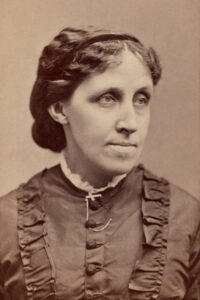
Jack and Jill, A Village Story
“Here comes Frank Minot, looking as solemn as a judge,” cried one, as a tall sixteen-year-old fellow spun by, with a set look about the mouth and a keen sparkle of the eyes, fixed on the distant goal with a do-or-die expression.
“Here’s Molly Loo And little Boo!”
sang out another; and down came a girl with flying hair, carrying a small boy behind her, so fat that his short legs stuck out from the sides, and his round face looked over her shoulder like a full moon.
“There’s Gus Burton; doesn’t he go it?” and such a very long boy whizzed by, that it looked almost as if his heels were at the top of the hill when his head was at the bottom!
“Hurrah for Ed Devlin!” and a general shout greeted a sweet-faced lad, with a laugh on his lips, a fine color on his brown cheek, and a gay word for every girl he passed.
“Laura and Lotty keep to the safe coast into the meadow, and Molly Loo is the only girl that dares to try this long one to the pond. I wouldn’t for the world; the ice can’t be strong yet, though it is cold enough to freeze one’s nose off,” said a timid damsel, who sat hugging a post and screaming whenever a mischievous lad shook the fence.
“No, she isn’t; here’s Jack and Jill going like fury.”
“Clear the track
For jolly Jack!”
sang the boys, who had rhymes and nicknames for nearly everyone.
Down came a gay red sled, bearing a boy who seemed all smile and sunshine, so white were his teeth, so golden was his hair, so bright and happy his whole air. Behind him clung a little gypsy of a girl, with black eyes and hair, cheeks as red as her hood, and a face full of fun and sparkle, as she waved Jack’s blue tippet like a banner with one hand, and held on with the other.
Read or download Book
Louisa May Alcott
Louisa May Alcott (November 29, 1832 – March 6, 1888) was an American novelist, short story writer, and poet who wrote the novel Little Women (1868) and its sequels Little Men (1871) and Jo’s Boys (1886).
Biography.
Raised in New England by her transcendentalist parents, Abigail May, and Amos Bronson Alcott, she grew up among many well-known intellectuals of the day, including Margaret Fuller, Ralph Waldo Emerson, Nathaniel Hawthorne, Henry David Thoreau, and Henry Wadsworth Longfellow. Alcott’s family suffered from financial difficulties, and while she worked to help support the family from an early age, she also sought an outlet in writing.
She began to receive critical success for her writing in the 1860s. Early in her career, she sometimes used pen names such as A. M. Barnard, under which she wrote lurid short stories and sensation novels for adults that focused on passion and revenge. Published in 1868, Little Women is set in the Alcott family home, Orchard House, in Concord, Massachusetts, and is loosely based on Alcott’s childhood experiences with her three sisters, Abigail May Alcott Nieriker, Elizabeth Sewall Alcott, and Anna Alcott Pratt. The novel was well-received at the time and is still popular today among both children and adults. It has been adapted for stage plays, films, and television many times. Alcott was an abolitionist and a feminist and remained unmarried throughout her life. She also spent her life active in such reform movements as temperance and women’s suffrage.
She died from a stroke in Boston on March 6, 1888, just two days after her father had died.






